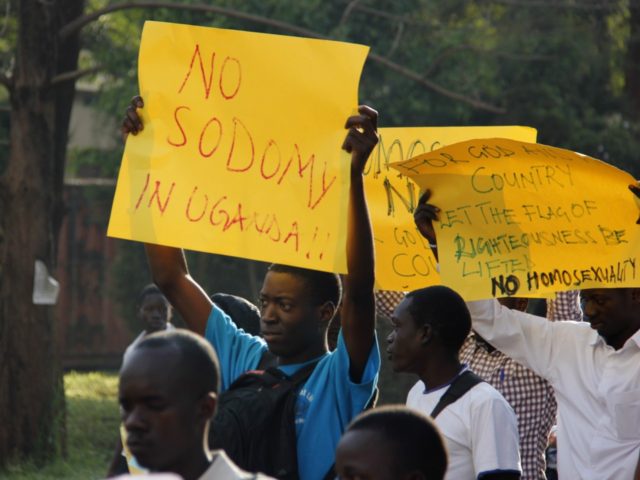Ugandan President Yoweri Museveni’s administration announced on Thursday that it will resurrect a bill that punishes homosexuality with death.
The bill revives 2014’s failed “Uganda Anti-Homosexuality Act,” which in itself was an extension of 2013 legislation that allowed authorities to imprison suspected gay Ugandan citizens for life. The bill was intended to “prohibit any form of sexual relations between persons of the same sex,” to the point of making even the “recognition” of homosexual relationships a crime.
In a statement, Ethics and Integrity Minister Simon Lokodo told Reuters:
Homosexuality is not natural to Ugandans, but there has been a massive recruitment by gay people in schools, and especially among the youth, where they are promoting the falsehood that people are born like that.
Our current penal law is limited. It only criminalises the act. We want it made clear that anyone who is even involved in promotion and recruitment has to be criminalised. Those that do grave acts will be given the death sentence.
Similar draconian measures are common across the continent, and the world at large. In May, Sultan Hassanal Bolkiah of Brunei was forced to back away from instituting the death penalty for homosexuality in the southeast Asian country. Last year, Russia saw a dramatic escalation in hate crimes toward its LGBT citizens after President Vladimir Putin enacted a ban on “gay propaganda,” which targeted visibly gay characters and personalities in Russian media.
There are currently 72 countries where being gay is a criminal offense. In many of those cases, it remains a death sentence. Ugandan politicians are confident that it will join them very soon. “We have been talking to the MPs and we have mobilized them in big numbers,” said Lokodo. “Many are supportive.” He is reportedly “optimistic” that it will pass with the required two-thirds majority.
The bill may again trigger an international outcry. When President Museveni signed the 2014 bill, a wave of retaliatory measures strangled the country’s economy. The United States, Sweden, Norway, Denmark, the Netherlands, and The World Bank suspended or redirected aid in the wake of the decision. Under this intense economic duress, the Ugandan government eventually paid a Washington-based lobbying firm millions to “clear [its] image.”
“It is a concern,” Lokodo admitted, “but we are ready. We don’t like blackmailing. Much as we know that this is going to irritate our supporters in budget and governance. … We can’t just bend our heads and bow before people who want to impose a culture which is foreign to us.”
Notably, Uganda has recently spoken in support of other human rights abuses; in particular, the pro-democracy protests in Hong Kong. In a statement issued on October 4, the country’s Ministry of Foreign Affairs said it “firmly supports the One country, two systems policy of the People’s Republic of China on the matter of Hong Kong and other areas.” Uganda is the only nation currently to vocally condemn the peaceful pro-democracy protests against communism in Hong Kong, though other nations have stood by silently in the wake of extreme police violence by the Chinese state.
Without legitimate recorse, Pepe Julian Onziema of the advocacy group Sexual Minorities Uganda is concerned, as are many other members of the country’s LGBT+ organization alliance. “Hundreds of LGBT+ people have been forced to leave the country as refugees and more will follow if this law is enacted,” he said. “It will criminalise us from even advocating for LGBT+ rights, let alone supporting and protecting sexual minorities.”

COMMENTS
Please let us know if you're having issues with commenting.